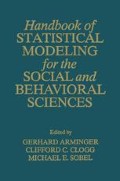Abstract
Quantitative social research relies heavily on data that originate either from surveys with sampling designs that depart from simple random sampling, or from observational studies with no formal sampling design. Simple random sampling is often not feasible, or its use would yield data with less information about certain features of interest, and it is often economically prohibitive. For example, in studies of school effectiveness it may be difficult to secure the cooperation of a school or a classroom. Therefore it would be rather wasteful to collect data from a small number of students in such a classroom. Data from a larger proportion, or from all the students, could be collected at a small additional expense, thus reducing the number of classrooms required for a sample to contain sufficient information for the intended purposes. Similarly, in household surveys, having contacted a selected individual, it would make sense to collect data from the rest of the members of the household at the same time. When this is done, we usually end up with data for which the standard assumptions of independence (such as in ordinary regression) are inappropriate.
Access this chapter
Tax calculation will be finalised at checkout
Purchases are for personal use only
Preview
Unable to display preview. Download preview PDF.
Author information
Authors and Affiliations
Editor information
Editors and Affiliations
Rights and permissions
Copyright information
© 1995 Springer Science+Business Media New York
About this chapter
Cite this chapter
Longford, N.T. (1995). Random Coefficient Models. In: Arminger, G., Clogg, C.C., Sobel, M.E. (eds) Handbook of Statistical Modeling for the Social and Behavioral Sciences. Springer, Boston, MA. https://doi.org/10.1007/978-1-4899-1292-3_10
Download citation
DOI: https://doi.org/10.1007/978-1-4899-1292-3_10
Publisher Name: Springer, Boston, MA
Print ISBN: 978-1-4899-1294-7
Online ISBN: 978-1-4899-1292-3
eBook Packages: Springer Book Archive

